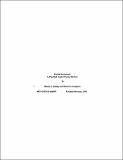| dc.contributor.author | Jacoby, Henry D. | en_US |
| dc.contributor.author | Laughton, David G. | en_US |
| dc.date.accessioned | 2009-12-15T23:56:09Z | |
| dc.date.available | 2009-12-15T23:56:09Z | |
| dc.date.issued | 1992 | en_US |
| dc.identifier | 91-014 | en_US |
| dc.identifier.uri | http://hdl.handle.net/1721.1/50170 | |
| dc.description.abstract | This paper presents a practical approach to project evaluation using techniques of modern financial economics, with a sample application to oil development under a complex tax system. The method overcomes shortcomings of conventional DCF methods which are either imprecise about the relation between economic value and uncertainty, or are rigid and unrealistic in the required assumptions about how a project's risks (and therefore its value) are influenced by market conditions, the project physical structure, and tax and contract provisions. It is based on the formulation and estimation of an "information model" which represents the resolution over time of uncertainties underlying a project (oil prices in the examples shown). Oil prices are the underlying uncertainty in the examples shown. The project can then be valued using derivative asset valuation, which replicates the consequences of a complex asset by a traded portfolio of simpler assets (in our case, riskless bonds and future claims on oil). For ease of implementation, the method is designed to resemble current industry practice. The information model can be estimated using analysis and judgment similar to that applied in conventional evaluation. The formulation of decision alternatives, the selection of underlying uncertainties, and the design of a cash-flow model are the same as in standard DCF methods. Simulation and valuation results also can be represented in a familiar format. Restrictions must be placed on the "best" current asset pricing theory to achieve this convenient framework: the expected returns on the basic assets, which comprise the portfolios traded to replicate project cash flows, must be assumed to be known with certainty at the time of an evaluation. | en_US |
| dc.description.sponsorship | Supported by the MIT Center for Energy Policy Research, the Social Science and Humanities Research Council of Canada, the Natural Science and Engineering Research Council of Canada, the Imperial Oil University Research Grants Programme, the Central Research Fund, a Nova Faculty Fellowship, the Muir Research Fund and the Institute for Financial Research of the University of Alberta. | en_US |
| dc.format.extent | 35 p | en_US |
| dc.publisher | MIT Center for Energy and Environmental Policy Research | en_US |
| dc.relation.ispartofseries | Working paper (Massachusetts Institute of Technology. Center for Energy Policy Research) ; MIT-CEPR 91-014. | en_US |
| dc.title | Project evaluation : a practical asset pricing method | en_US |
| dc.type | Working Paper | en_US |
| dc.identifier.oclc | 28596195 | en_US |
